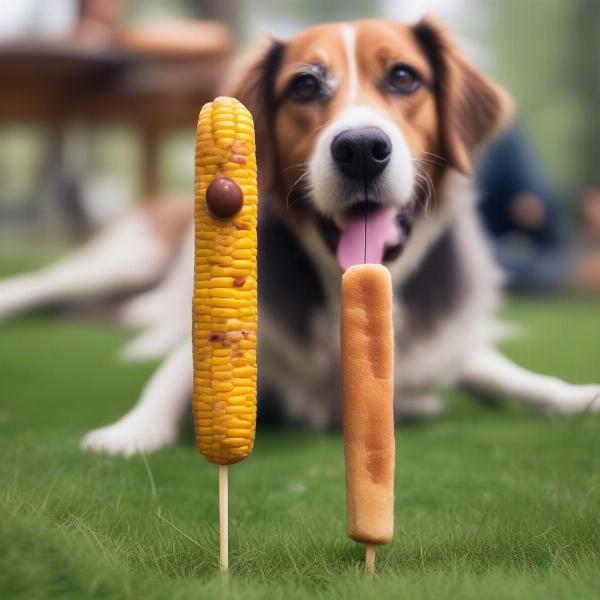Mr. Cow corn dog is a term that might pique the interest of dog owners looking for a tasty treat for their furry friends. While the image of a dog enjoying a classic corn dog might seem appealing, it’s essential to prioritize your dog’s health and safety. This article will delve into whether corn dogs are suitable for dogs, exploring healthier alternatives and safe treat options. We’ll also discuss the importance of a balanced diet and how to choose appropriate treats for your canine companion.
 Is Mr. Cow Corn Dog Safe for Dogs?
Is Mr. Cow Corn Dog Safe for Dogs?
While the occasional small bite of a plain, unseasoned corn dog might not cause immediate harm, it’s generally not recommended as a regular treat for dogs. Corn dogs are high in fat, salt, and processed ingredients, none of which contribute to a healthy canine diet. The high fat content can lead to pancreatitis, a serious and potentially life-threatening condition. The stick itself also poses a choking hazard, and splinters can cause injuries to your dog’s mouth and digestive tract.
Healthy Alternatives to Mr. Cow Corn Dog
Instead of offering your dog a Mr. Cow corn dog, consider healthier, dog-specific treats. Many commercially available treats are formulated to meet your dog’s nutritional needs and come in various flavors and textures. Look for treats made with natural ingredients and avoid those with artificial colors, flavors, or preservatives. dog treat names
You can also make homemade treats using simple ingredients like lean meat, vegetables, and whole grains. These homemade treats allow you to control the ingredients and tailor them to your dog’s specific dietary needs. Recipes for homemade dog treats are readily available online and in pet care books. Remember, treats should only make up a small portion of your dog’s daily calorie intake.
Choosing the Right Treats for Your Dog
Choosing the right treats depends on your dog’s age, breed, size, activity level, and any existing health conditions. Puppies, for example, might benefit from soft, chewable treats, while senior dogs might require softer treats due to dental issues. best treats for dogs with allergies
Always check the ingredient list and choose treats that are appropriate for your dog’s size and age. For dogs with allergies, opt for hypoallergenic treats made with limited ingredients.
The Importance of a Balanced Diet
Providing your dog with a balanced diet is crucial for their overall health and well-being. A complete and balanced diet should provide all the essential nutrients your dog needs to thrive. This includes protein, carbohydrates, fats, vitamins, and minerals. dog bone peanut butter
Consult your veterinarian to determine the best diet for your dog, considering their individual needs and any specific health concerns. They can recommend appropriate food brands and portion sizes to maintain a healthy weight and prevent nutritional deficiencies.
Conclusion
While a Mr. Cow corn dog might seem tempting to offer your furry friend, it’s essential to prioritize their health and well-being by choosing safe and nutritious treats. Opt for healthier alternatives, such as commercially available dog treats made with natural ingredients or homemade treats using wholesome ingredients. Remember to consult your veterinarian for guidance on the best diet and treat options for your individual dog’s needs. By making informed choices, you can ensure your canine companion enjoys a long, healthy, and happy life.
FAQ
- Can dogs eat corn dogs? While a small bite might not be immediately harmful, corn dogs are not recommended for dogs due to their high fat, salt, and processed ingredient content.
- What are some healthy alternatives to corn dogs for dogs? Consider dog-specific treats made with natural ingredients or homemade treats using lean meat, vegetables, and whole grains.
- How do I choose the right treats for my dog? Consider your dog’s age, breed, size, activity level, and any existing health conditions. Consult your veterinarian for personalized advice.
- Why is a balanced diet important for dogs? A balanced diet provides all the essential nutrients your dog needs to thrive, preventing nutritional deficiencies and promoting overall health.
- How can I ensure my dog has a balanced diet? Consult your veterinarian to determine the best diet and portion sizes for your individual dog’s needs.
- What should I do if my dog eats a corn dog? Monitor your dog for any signs of digestive upset and contact your veterinarian if you have any concerns.
- Are there any safe human foods I can give my dog as a treat? Yes, some safe human foods for dogs include small amounts of cooked chicken, carrots, apples, and plain yogurt. Always consult your veterinarian before introducing new foods to your dog’s diet.
ILM Dog is a leading international website dedicated to providing dog owners with expert advice on all aspects of dog care and wellbeing. From breed selection and puppy care to senior dog care and training tips, we offer comprehensive resources to help you provide the best possible care for your canine companion. We specialize in Dog Breeds and Selection, Dog Health and Medical Care, Dog Training and Behavior, Dog Nutrition and Feeding, Dog Grooming and Hygiene, and Dog Products and Accessories. Contact us today for personalized advice and support! Email: [email protected], Phone: +44 20-3965-8624. Visit ILM Dog for more information.